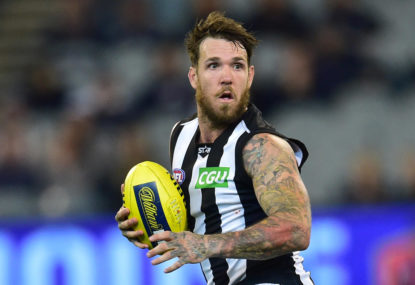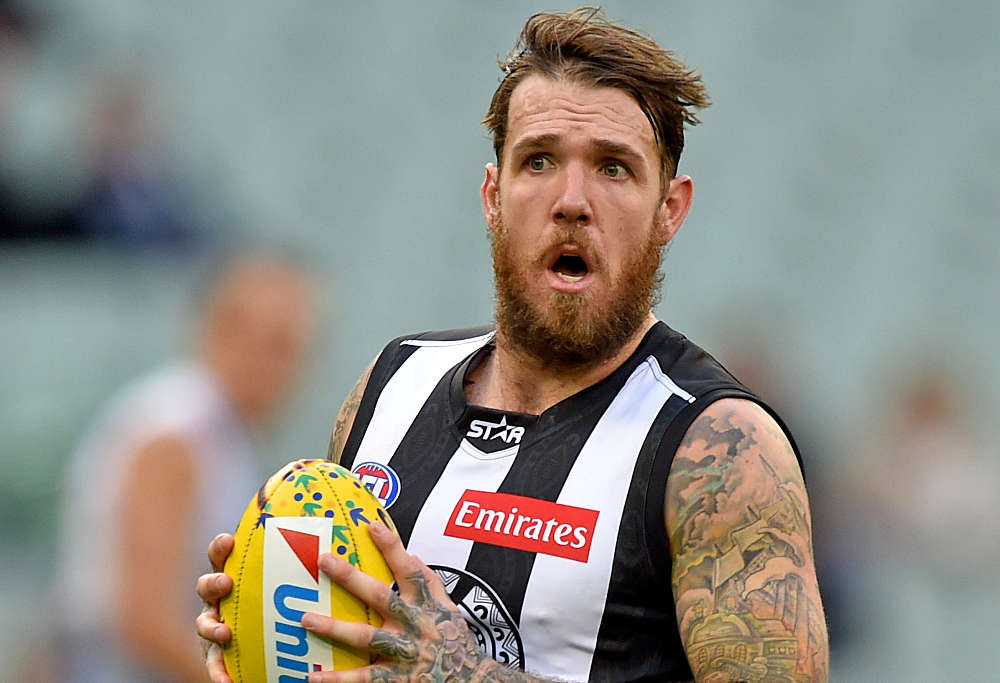AFL News: Scott hits out at 'offensive' Tribunal call to clear Cameron, Pies to swoop on star Dog?
Geelong coach Chris Scott has hit out at the AFL Tribunal's decision to clear Charlie Cameron for his dangerous tackle on Jake Lever, saying…

In our minds we have an idea of what superstars look like and it’s an image that Dane Swan never cohered with.(Click to Tweet)
For so long, we needed the stat sheet to tell us that he was a star, and even then we didn’t believe it, trusting our eyes instead. And what our eyes saw was something entirely unimpressive – a clumsy player who couldn’t kick and had the gait of a frightened penguin.
Swan’s greatest physical gifts were his acceleration and strength, a pair of attributes that are typically easy to romanticise, but his talents were so uncoordinated that he could never come close to replicating the aesthetic poetry of a Ben Cousins or Patrick Dangerfield.
Few kids will grow up wanting to play football like Dane Swan, which makes sense, because most of them probably already vaguely resemble the way he played.
If you looked hard enough, though, there was beauty in the way he went about it. His captain, Scott Pendlebury, sees things before they happen on the field. Jesse White sees things after they happen. Swan saw things exactly as they did happen, and his athletic gifts, however unconventional, allowed him to react to them and prosper as they came and went. He played in a way that should have been chaotic, but he was so blessed and brilliant that he could always leave chaos in his wake.
In 2010 and 2011 he left the competition in his wake. Swan’s peak lasted longer than that, properly beginning in 2009 and wrapping up in 2013, but it was in these two grand final seasons that he was the unstoppable force the AFL stood in befuddled awe of.
He couldn’t be tagged, too fast and too strong to be contained, with a strange short-burst endurance that nobody could keep up with. That, ultimately, is what made Swan so idiosyncratically magnificent – the ability to accelerate over and over again, his waddles breaking into sprints, relentlessly.
As devastating as he was, it’s still hard to think of Swan as the third most decorated player of the 21st century. But with his premiership medal, Brownlow medal and three other top-four finishes, MVP, five All-Australian selections, three best and fairests and two Anzac medals, only Chris Judd and Gary Ablett Jr have a longer list of accolades than Swan among players drafted since 2000.

He had more consistent team success than Judd or Ablett, playing finals every year from 2006 to 2013, and was the best player on a team that won the flag in 2010 and posted the most dominant home-and-away season of the past 100 years (by percentage, at least) in 2011. All this and he was a Collingwood player who managed to become one of the most beloved personalities in the game, an achievement perhaps surpassing his Brownlow.
But Swan will never be remembered in the same breath as Judd and Ablett, or Adam Goodes, Nick Riewoldt and Lance Franklin. Far less individually decorated players like Luke Hodge and Joel Selwood will likely be remembered more fondly by history too. The reasons for this go beyond Swan’s unusual gait.
Swan was never a leader, and he didn’t rise to the occasion as often as champions are expected to. He played in three grand finals and didn’t play up to his standard in any of them. I’ll never forget sitting at the MCG during the 2010 grand final replay and seeing Swan, the Brownlow medal favourite a week before, lining up on Brendon Goddard to start the second half and realising that Mick Malthouse was making him tag Goddard to try and get him in the game.
You would never see that happen to Judd or Ablett, and those two and the likes of Michael Voss, James Hird and Nathan Buckley had an aura of transcendence that Swan never possessed. When Ablett kicked goals in big games he acted like he knew they were in never doubt, and they never were. Swan always looked a little surprised when he delivered in the clutch, his manic, inelegant, euphoric goal and celebration to ice the 2010 replay fittingly symbolic.
But Swan had his moments on the big stage. Collingwood have won two preliminary finals in the past decade and Swan was the most dominant player in both of them, the latter, the three-point win over Hawthorn in 2011, the tensest football match I’ve witnessed. On Anzac Day in 2012 he played the best game of football I’ve ever seen from a Collingwood player, putting Essendon to the sword almost by himself with 42 touches and three goals.
Swan’s career faded out a little innocuously after the 2013 season, perhaps not uncoincidentally the last time Collingwood played finals. He was poor in 2014, his foot skills declining with his athleticism, but bounced back with an excellent 2015.
There was hope for this season and maybe the next that he could transition to more of a forward’s role like his coach was once expected to, but like his coach, Swan had those plans derailed by injury.
It’s ironic, and more than a little poetic, that the football player most associated with statistical accumulation finished his final game with an empty stat-line, which was enough to knock him just below Greg Williams to second on the all-time leaderboard for average disposals per game. Somehow, though, I can’t see really Swan giving a stuff about that.
I met Swan a few years ago at a Melbourne night time establishment that won’t be divulged, to prevent his embarrassment but mostly mine (It was in the offseason, Bucks). He was sitting on a couch in the corner, wearing a hat and a scoop-necked white t-shirt, sipping on his drink a little nervously. A mate told me to go over to Swan and say hello. I thought about it for a second. I’d never go up to a Pendlebury, Hodge or Selwood – it’s unruly for mere men to presume to converse with gods. But Swan wasn’t intimidating in the same way – that was his gift and his curse.
I walked over to Swan, not in my most coherent state, accidentally brushed arms with Marley Williams, who told to me “watch it” (which I did, because it was Marley Williams), and almost tripped on Alex Fasolo’s leg.
I went up to Swan and garbled some nonsense with him for about a minute while he sat there politely and listened. I shook his hand, he said it was nice to meet me, and then I walked back to my mate, who asked me: “Well, what’s he like?”
“Pretty normal bloke, really,” I replied, inadvertently articulating what made him so special both off the field and on it.